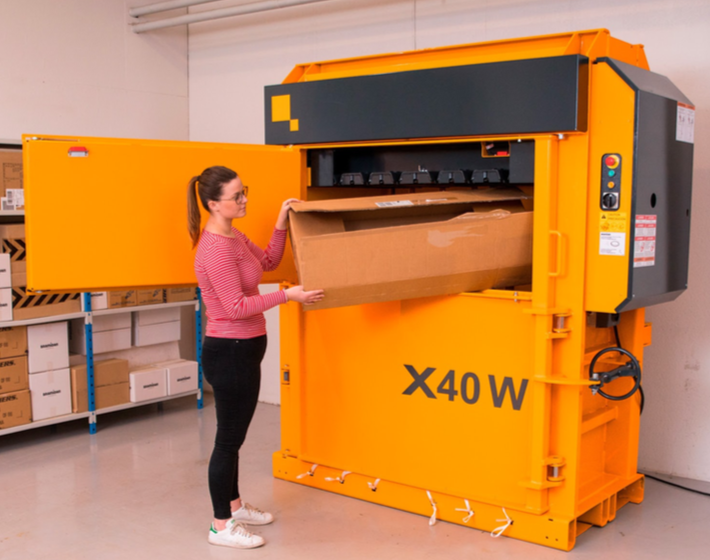
How Compactors and Balers Help Battle Global Warming
Global warming is a pressing issue that isn’t going away unless we do something about it. In order to battle the ever-growing problem, it is crucial for corporations and businesses to take an honest, hard look at their waste management systems. The good news is that reducing your company’s greenhouse gas emissions could be as simple as investing in a trash compactor and cardboard baler. In this article, we’ll lay out exactly how compactors and balers help battle global warming.
Overview of Global Warming
Global warming was first recognized as a problem in 1988, and it can be defined as the gradual increase of the Earth’s average surface temperature due to human activity. The top contributor to global warming is the heightened emission of greenhouse gases, including carbon dioxide and methane.
While greenhouse gases are naturally present in the atmosphere, excessive amounts are bad news. Normally, gases in the atmosphere allow sunlight to pass through and warm the planet’s surface. Too much greenhouse gas, however, traps the outgoing radiation and doesn’t allow it to escape. Like a blanket, these gases warm the atmosphere and disturb the climate.
The main greenhouse gases are carbon dioxide, methane, nitrous oxide, and water vapor (which all occur naturally), and fluorinated gases (which are synthetic).
How Trash Drives Greenhouse Gas Levels Up
The levels of greenhouse gases in the Earth’s atmosphere have risen significantly because of human activities. Although climate change is a complicated problem with a diverse range of contributing factors, the impact of trash and waste cannot be understated.
In landfills, decomposing trash produces huge amounts of methane and carbon dioxide. According to the Environmental Protection Agency (EPA), municipal solid waste landfills are the third largest producers of human-related methane emissions in America. That was 14.1% of the methane emissions from 2017.
This figure does not factor in the emissions from heavy-duty pickup trucks that drive to and from landfills to collect waste every day of the week. Worldwide, burning gasoline and diesel to power transportation systems accounts for 14% of global greenhouse gas emissions. The United States is a huge contributor to this percentage. In fact, our transportation – including cars, planes, public transit, and all petroleum-burning vehicles – is the largest producer of greenhouse gas emissions in America. In 2017, it accounted for 28.7% of U.S. emissions.
Climate Change Is Everybody’s Problem
If we continue on this path without regard for how our actions affect the earth, we will see an increase of up to nine degrees Fahrenheit by the end of this century. With this temperature increase, we will also see:
- An increase in disastrous weather events, such as hurricanes, floods and wildfires
- The displacement and extinction of plant and animal species
- A decrease in crop yields of 5 – 15% per degree increase
- Rising sea levels and coastal flooding
- The spread of diseases
- A decrease in the quality of air and water
The good news is that we have the power to take action and reduce our emissions.
How Compactors and Balers Help Battle Global Warming
There are many ways businesses can help reduce their carbon footprint, but one of the most impactful is through waste management. This includes reusing, recycling, and composting materials whenever possible. If these practices are already implemented in your business, better waste management could be as simple as investing in a high-quality trash compactor and baler.
Trash Compactors Reduce Waste Volume and Pickups
With a compaction ratio of up to 10:1, trash compactors significantly reduce the volume of waste going into a landfill to decompose and emit greenhouse gases. Further, by reducing garbage truck trips from 7 days a week to just one day a week, carbon emissions from transportation could be reduced by up to 600%.
Consider Company A’s scenario:
Company A is a large business with 5,000 employees across all sectors and chains. As a company that operates 24 hours a day and deals with paper and plastic goods, it generates a great deal of waste. Company A does not have a solid recycling plan in place, and about 65% of their recyclable paper waste ends up in their dumpsters. Each location receives daily trash pickups, but the dumpster areas are still overflowing and unsightly. Annually, Company A contributes 500,000 pounds of waste to landfills. That 500,000 pounds of waste produces 1,250,000 pounds of CO2 as it decomposes.
After a consultation with waste management experts, Company A decides to invest in an industrial trash compactor for each of its locations. The compaction rate of 20:1 allows the company to reduce its trash volume by 350,000 pounds per year. That saved 900,000 pounds of carbon dioxide from trash decomposing in a landfill! Finally, Company A cut down their trash pickup days to twice a week and their trash hauling payments are halved.
Balers Help with Recycling and Reducing Pollution
Did you know that paper and cardboard make up the majority of industrial waste products? One way to majorly reduce your company’s environmental impact is through baling your recyclables. A baler takes recyclable materials, such as cardboard and paper, compresses it into dense blocks, and ties the blocks together for easy transport. The use of a baler can increase a business’s recycling rate by up to 400%.
Remember Company A? After their trash compactor was so successful in reducing their trash volume, CO2 emissions, and hauling costs, Company A decided to invest in a cardboard baler as well. Prior to these new tools, Company A needed trash pickups daily from their hauling service. Since the recycling center is 20 miles away, the garbage collection truck’s daily journey produces 640,640 grams of greenhouse gas annually. After implementing the baler and compactor, however, Company a reduced its pickups to just one day a week. This saves 549,120 grams of CO2 from transportation alone, not to mention the increased recycling rate.
Further Environmental Benefits of Balers and Compactors
In addition to reducing greenhouse gas emissions, balers and compactors offer other environmental benefits:
- They help you save space. Reduce manual handling equipment and the number of bins required by replacing with a baler or compactor
- They reduce landfill tax costs. Landfills in California charge a median of $45 per ton.
- Balers can make a marketable product: Cardboard and paper bales can be sold to brokers or mills, who will pay a premium for clean, sorted material.
Companies that invest in a compactor and baler can reduce their environmental impact while also making it easier to recycle materials. When businesses make the switch to better waste management practices, they are doing their part in reducing greenhouse gas emissions and helping preserve our planet for future generations.
If you’re looking for ways to make your business more sustainable, or just looking to save time, space, and money, consider investing in a compactor and baler today.
Get in Touch
To learn more about sustainable approaches to industrial waste management, contact us at Bay Area Trash Compactor. For the past thirty seven years, we have supplied high-quality services to everyone from McDonald’s and Starwood Resorts to Kaiser Hospitals and Safeway. With our constantly growing range of products and our customer-oriented strategies, our services can save you time, energy, and money. Learn more by calling us at (833) 562-0665 or emailing [email protected].
